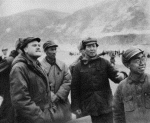|
 Mao Tolerated Christmas Before Takeover Mao Tolerated Christmas Before Takeover
 Send a link to a friend
Send a link to a friend
[December 22, 2007]
HONOLULU (AP) -- In a long and speckled career overseas, I have witnessed many unusual Christmases. None were more peculiar than the two spent in the exile capital of the godless fathers of Chinese communism, whose heirs are sponsors next August of the originally pagan Olympic games.
[Caption: Mao Tse-tung, second
from right, talks with Associated Press correspondent John Roderick,
left, in Yenan, China, as they await a flight carrying communist
Chinese negotiator Chou En Lai, Jan. 27, 1946. (AP Photo/FILE)]
|
|
The scene was Yanan, the city of 10,000 caves, which I visited for seven months between 1945 and 1947, before Mao Zedong and his armies marched from there to Beijing where the games will be held eight months from now.
I arrived there a Maine boy with hayseed still in his hair. Beside me were three veteran reporters, also sent to cover Mao's side of the ultimately failed American-sponsored talks to create a coalition where Communists and Nationalists would govern together rather than continue their warring ways.
It was a generous gesture on the part of the United States. Mao, ever ready to take advantage of an opening, was grateful. He showed it at Christmas and on New Year's Day by visiting the caves where I and a handful of American soldiers lived.
The military unit was the U.S. Army Observation Group, better known as the "Dixie Mission." The soldiers originally went to Yanan to rescue, with Communist help, American pilots downed by the Japanese during World War II. They stayed on to do what they could to further the coalition talks.

I met Mao, his wife, Jiang Qing, and his followers many times after that. But the atmosphere of friendliness never again reached the peaks of those two holiday periods.
Christmas for me and the American military men included turkey and "fixins" flown in from the U.S. base in Shanghai, about 800 miles to the southeast. The American military always rose to the occasion at Christmas and Thanksgiving.
The rest of the year, the Dixie Mission and I depended on the undoubted skill of our Chinese cook. By the time the second Christmas rolled around, I had permanent indigestion, perhaps because of the American lard that he used in superabundance.
On the second Christmas at Yanan, I hosted a private banquet whose centerpiece was a brace of plump pheasants I had bagged the day before. Murdered in cold blood, I should add. The unsuspecting fowl were so unused to human aggression that they fluttered their wings at the sound of gunfire but otherwise remained motionless, no matter how many times I missed them.
Though our dining hall was gaily decorated and there was a small Christmas tree, the holiday was largely perfunctory. The soldiers had their duties and I had mine, centered on the newsworthy Communists who, along with the 40,000 poor residents of Yanan, largely ignored the Yuletide festivities.
[to top of second column]
 |
 There were no gifts. When I once did send a simple present to Mao it was politely returned. It was not, he said, the custom.
Later, when I quit Yanan, Mao offered to pick up my board bill, a gesture I equally politely declined. I instead paid the stiff-backed American commander, Col. Ivan D. Yeaton. By then, the "who lost China?" campaign in the United States was beginning to raise its head and I recognized that news of Mao footing my tab would be pounced on by anti-Communist crusaders. The bill ended up on my Associated Press expense account.
Other U.S. correspondents in those pro-American days were allowed by the Nationalists to briefly visit the barricaded Red city. Some stayed longer than others, among them the Rev. Patrick O'Connor, war correspondent of the Catholic News Service. The good priest celebrated a simple Mass for a handful of the Americans.
That O'Connor, of the Christianity that Marxism regarded as a snare and a delusion, was in Yanan was big news. His presence was evidence of how far Mao's Communists were willing to go to curry favor with the Americans.

To show that O'Connor was welcome, Mao also permitted the priest to visit the abandoned, old Catholic cathedral. Filled with rice storage bags and covered in dust, O'Connor tried unsuccessfully to have the church restored to its former function. He did succeed, however, in getting an interview with Zhou Enlai, China's future premier.
The Communists of the 1940s and later were unrepenting opportunists. They turned on the faucet of friendliness for their longtime enemies, the Americans, at Christmas and hosted a Catholic priest when it suited their larger purposes. The end to them justified the means.
In the same way, peppery little Deng Xiaoping, Mao's successor, blithely adopted the capitalist free market as his own. The result can be seen today in China's burgeoning economy and its proud sponsorship of one of the ornaments of a free society
- the Olympic games.
[Associated
Press; By JOHN RODERICK]
Copyright 2007 The Associated
Press. All rights reserved. This material may not be published,
broadcast, rewritten or redistributed. |